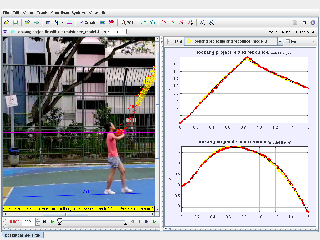

About
For Teachers
- basketballmodelchen_ximinmp4.mp4
Credits
Author: chen ximin, model lookang
Briefing Doc: 🏀Tracker Basketball Model Throw Simulation
Source: Excerpts from "Tracker Basketball Model Throw by RGS Chen XiMin - Open Educational Resources / Open Source Physics @ Singapore"
Main Themes:
- Educational Resource: The webpage showcases an interactive physics simulation created by Chen XiMin of Raffles Girls' School, highlighting its value as an Open Educational Resource (OER).
- Physics Concepts: The simulation focuses on key physics concepts, specifically kinematics and dynamics, applied to a real-world scenario of a basketball throw.
- Technology Integration: The resource leverages Tracker software, indicating the integration of technology in physics education to enable visual analysis and data-driven learning.
- Target Audience: The resource is tagged for various educational levels, including Secondary, Junior College, and even Physical Education, suggesting its versatility and adaptability for different learners.
Important Ideas/Facts:
- The webpage is hosted on the "Open Educational Resources / Open Source Physics @ Singapore" platform, signifying the commitment to accessible and collaborative learning.
- The simulation allows users to explore the physics of a basketball throw, likely involving variables such as velocity, angle, and trajectory.
- The inclusion of Tracker suggests the simulation allows users to analyze real or simulated video footage of a basketball throw, extracting data and visualizing the motion.
- The broad tagging of educational levels implies the simulation can be used for diverse pedagogical purposes, from introductory concepts to more advanced analysis.
Quotes:
- Tags: "Secondary," "Kinematics," "Dynamics," "Junior College," "Tracker," "Physical Education" - These tags highlight the simulation's relevance to various educational levels and subject areas.
Overall Impression:
This resource demonstrates the effective use of technology and simulations in physics education. The Tracker-based basketball throw simulation provides an engaging and interactive way for students to learn and explore fundamental physics concepts in a relatable context. The emphasis on open educational resources fosters a collaborative and accessible approach to learning.
Tracker Basketball Model Throw Study Guide
Short-Answer Questions Quiz
Instructions: Answer the following questions in 2-3 sentences.
- What is the primary subject area that the "Tracker Basketball Model Throw" resource focuses on?
- What software is used in the "Tracker Basketball Model Throw" simulation? What are its key applications?
- List three academic levels for which the "Tracker Basketball Model Throw" resource is considered appropriate.
- What is the main purpose of Open Educational Resources (OER)?
- How can the "Tracker Basketball Model Throw" resource be used in a physical education setting?
- What is the significance of the "Credits" section on the resource page?
- Briefly describe how the organization of the webpage using breadcrumbs benefits the user.
- Identify two physics concepts that are relevant to modeling a basketball throw.
- Based on the "Popular Tags" section, name three other popular physics simulations available on the website.
- Besides physics, what other scientific subject area has a substantial presence in the listed resources?
Answer Key
- The "Tracker Basketball Model Throw" resource focuses on physics, particularly the study of motion in the context of a basketball throw.
- The "Tracker Basketball Model Throw" simulation uses Tracker software. Tracker is a free, open-source video analysis and modeling tool, widely used in physics education to analyze the motion of objects in videos.
- The resource is deemed appropriate for secondary school, junior college, and university levels.
- Open Educational Resources (OER) aim to provide free and accessible learning materials to everyone. They promote educational equity and encourage the sharing and adaptation of resources.
- In physical education, the "Tracker Basketball Model Throw" resource can be used to analyze and improve throwing techniques. Students can record their throws, use Tracker to analyze the trajectory and velocity of the ball, and identify areas for improvement.
- The "Credits" section acknowledges the individuals and organizations who contributed to the development and implementation of the "Tracker Basketball Model Throw" resource. It recognizes their work and intellectual property.
- Breadcrumbs on the webpage provide a clear navigational path showing the user's location within the website hierarchy. This enhances website usability and allows for easy navigation back to previous levels.
- Two physics concepts relevant to modeling a basketball throw are projectile motion and kinematics. Projectile motion describes the curved path of the ball, while kinematics analyzes the motion's characteristics like velocity, acceleration, and displacement.
- Based on the "Popular Tags," other popular physics simulations include those related to gravity, Newtonian mechanics, and superposition.
- Aside from physics, chemistry also has a substantial presence in the listed resources, as evidenced by tags like "Electrolysis" and "Transfer of thermal energy."
Essay Questions
- Explain how the use of Tracker software enhances the learning experience in studying the physics of a basketball throw. Discuss the benefits and limitations of using a simulation versus real-world experimentation in this context.
- Describe in detail the key kinematic parameters that can be analyzed using the "Tracker Basketball Model Throw" simulation. How can these parameters be used to evaluate and improve the effectiveness of a basketball throw?
- Discuss the potential applications of the "Tracker Basketball Model Throw" resource in a multidisciplinary educational setting. Explore how this resource could be integrated into physics, mathematics, physical education, and computer science curriculums.
- Analyze the advantages of Open Educational Resources (OER) in promoting science education. Consider their impact on accessibility, equity, and the collaborative development of learning materials.
- How does the “Tracker Basketball Model Throw” resource reflect the broader goals of Open Source Physics @ Singapore? Explain the importance of initiatives like this in shaping the future of science education.
Glossary of Key Terms
Breadcrumb: A navigational aid used on websites to show the user's current location within the site hierarchy.
Dynamics: A branch of mechanics that deals with the study of forces and their effects on motion.
Junior College: A post-secondary educational institution that offers a two-year pre-university program.
Kinematics: A branch of mechanics that describes motion without considering the forces causing it.
Open Educational Resources (OER): Freely accessible and reusable learning materials that promote educational equity and collaboration.
Open Source Physics: An initiative that provides open-source tools and resources for physics education.
Physical Education: An academic subject that focuses on developing physical fitness and skills through movement and exercise.
Projectile Motion: The curved path an object follows when launched or thrown into the air.
Secondary School: The stage of education that follows primary school and precedes higher education.
Tracker: A free, open-source video analysis and modeling tool used in physics education to study the motion of objects.
Tracker Basketball Model Throw FAQ
What is the "Tracker Basketball Model Throw"?
The "Tracker Basketball Model Throw" is an educational resource hosted on the Open Educational Resources / Open Source Physics @ Singapore website. It is designed for secondary and junior college students and utilizes the Tracker software to analyze the kinematics and dynamics of a basketball throw.
What subjects does this resource cover?
This resource primarily covers the subjects of kinematics and dynamics in physics. It is also relevant to physical education and can be used in conjunction with computer science lessons on Tracker software.
What software is required to use this resource?
The resource utilizes the Tracker software, which is a free and open-source video analysis and modeling tool. Tracker is available for Windows, MacOS, and Linux operating systems.
What are the learning objectives of this resource?
By using this resource, students will be able to:
- Apply principles of kinematics and dynamics to analyze a basketball throw.
- Utilize Tracker software to track the motion of an object in a video.
- Interpret data obtained from Tracker to draw conclusions about the motion of the basketball.
- Relate the physics concepts to real-world applications in sports.
What is the target audience for this resource?
This resource is primarily aimed at secondary and junior college students studying physics. It can also be beneficial for physical education teachers looking to incorporate physics concepts into their lessons.
How can I access this resource?
You can access the "Tracker Basketball Model Throw" resource on the Open Educational Resources / Open Source Physics @ Singapore website. Navigate to the website and use the search function to find the resource.
Are there any other similar resources available on the website?
Yes, the Open Educational Resources / Open Source Physics @ Singapore website hosts a plethora of interactive resources covering various topics in physics, chemistry, and mathematics. You can browse the website by subject and level to find resources relevant to your needs.
What is the licensing agreement for the "Tracker Basketball Model Throw" resource?
The contents of the resource are licensed under the Creative Commons Attribution-Share Alike 4.0 Singapore License. This means you are free to share and adapt the material, provided you give appropriate credit and distribute your contributions under the same license.
- Details
- Parent Category: 03 Motion & Forces
- Category: 01 Kinematics
- Hits: 6041
